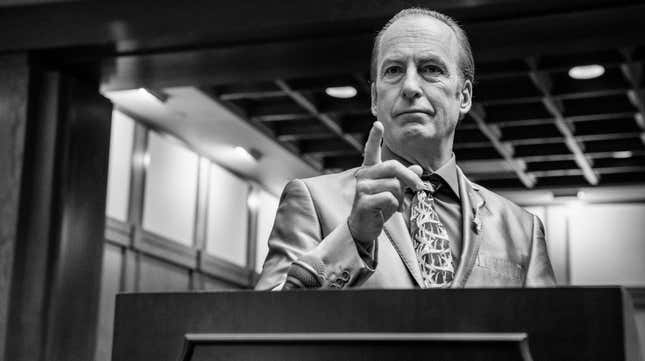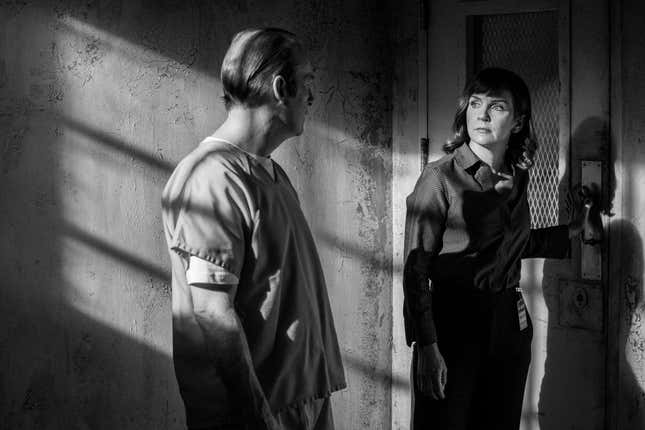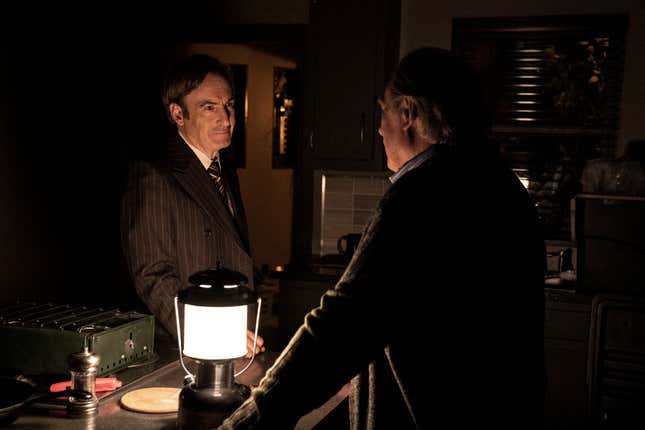
[Editor’s note: This piece contains spoilers of the series finale of Better Call Saul. Obviously.]
We bid adieu to Better Call Saul last night in an episode that, while still keeping Saul’s distinct pacing and aesthetic, actually packed in quite a lot, including a bunch of blasts from the pasts in the forms of Walter White (Bryan Cranston), Mike Ehrmantraut (Jonathan Banks), Chuck McGill (Michael McKean), and Marie Schrader (Betsy Brandt), not to mention some classic Saul courtroom trickery, as well that big reunion we’d been hoping for. So now that we’ve had several hours to sleep and digest what we saw in that Peter-Gould-penned-and-directed sendoff, let’s get into it and answer, simply: What did you think of Better Call Saul’s series finale? As always, let us know your takes in the comments.
William Hughes
Gene Takavic, the cornered rat, hurls himself into a downtown Omaha dumpster, desperate in his pursuit of one last second of miserable, monochrome freedom. Saul Goodman, the polished conman, spins tales, and sows doubts, for a crew of government lawyers who should know, should know down to their very souls, that they’ve got this bastard dead to rights. But it’s Jimmy McGill, in the end, who took the stand last night. Jimmy, the honest crook. Jimmy, the guy who always does the worst things for the best possible reasons. And so he does.
Is there a whiff of fan service to last night’s Better Call Saul finale? To seeing James McGill answer at last for the crimes he committed on behalf of Walter White—echoing, in the process, the man’s own bracingly honest “I did it because I liked it” from the Breaking Bad finale, nine years earlier? And also answering for the crimes that are not crimes, that only he, and we, know have been corroding his soul since the day his brother died? Maybe. It’s difficult, for instance, to fully connect the bitter, ruined man who came within a moment’s bad break of strangling poor Marion with her own phone cord just a few days earlier to Jimmy’s final act of showmanship/self-immolation/self-sacrifice. But so what? Wish fulfillment is rarely this elegant, at least, as “Saul Gone” threads in farewells to Jonathan Banks, Bryan Cranston, and especially Michael McKean, showing Jimmy and Saul unconsciously desperate to have conversations with Mike and Walter that he could never bring himself to have with Chuck. And it’s not like we’re promised redemption here, or absolution, not really—even as Kim offers Jimmy one last quiet smoke break deep within a friendly shadow. All we get is a flicker of flame—the only color in the entire world—and a final parting look. And it’s the kind of look you give someone you don’t expect to see again.

Saloni Gajjar
Gratifying, excruciating, beautiful. Yeah, that about sums up how it felt to watch Better Call Saul wrap its meritorious run. Jimmy McGill finally letting go of Saul Goodman and Gene Takovic is an honest representation of who he is at the core. Ultimately, he’s a small-time shady lawyer from Albuquerque who no one thought would be any good, not even his own brother (for some wise reasons, of course), until Kim Wexler came around. Their complex relationship evolved into the show’s driving force and how Jimmy functions. Kim was the thin line separating him from going full Saul, after all. So to me, it rings true that learning about her coming clean is a pivotal moment that inspires him to do the same. Could he have gotten away with that seven-year sentence? Hell yes. But would he be able to live with himself knowing that any contact with Kim thereafter might be a repeat of the disastrous phone call they shared? I don’t think so. As he says in the courtroom, he already has to live with knowing what caused Chuck to kill himself, and that if he didn’t defend Walter, several people would still be alive. His regrets go beyond that “slip-and-fall” incident. And he tries to rectify some of it in “Saul Gone” without the writing fawning over any redemption.
The most striking shot of the episode was when Kim leaves the prison, and the two of them look at each other with the barbed wires separating them. The distance speaks volumes despite their previous interaction of sharing a cigarette. (That scene, too, is so well-lit and sexy, it made me think the two are going to bang it out. Bob Odenkirk and Rhea Seehorn’s chemistry was on fire.) BCS’s closing moments reminded me of a couple of my favorite series finales of all time, The Americans and BoJack Horseman, in how the protagonists run from their pasts before finally reckoning with them from a place of acceptance. There’s empathy but also an understanding that it’s the tragically right conclusion. Jimmy deserves to serve time for his horrible actions, and it’s worth arguing that living as Gene was nothing short of jail time either (a black-and-white existence with nothing to do except managing a mall Cinnabon). At least he won’t be running anymore.
Matt Schimkowitz
Caught in a dumpster, covered in slop, you can bet that Jimmy McGill wished he had that time machine.
The finale is a gratifying, heart-wrenching, and haunting last trip via time machine to three versions of Jimmy: Saul, the lawyer who thinks wealth equals freedom and respect; Gene, the tactful, quiet, and pathetic manager; and Jimmy, a simple brother to a disturbed but revered genius. If dumpster Jimmy had a time machine, he’d probably go back to this moment with Chuck. Maybe things could’ve been different. We know that’s not what happened, and the possibility for change (to not take that bribe, to not fixate on lost fortune, and to spend time with your brother) are all opportunities lost to time. All that’s left is a wall.
In the final, brilliant half-hour, Jimmy is all three. He’s the conniving lawyer, the sad sack, and the likable motormouth that keeps Kim Wexler coming back to him. She sees the whole Jimmy, not whatever suit he has on that day. And then, there they were, Kim and Jimmy, back at the beginning, up against the wall and plotting to break bad. But a wall isn’t a time machine. A wall is just a wall. And Jimmy’s going to be staring at the same one for some time to come. It’s a haunting final shot as the camera leaves Jimmy behind a slab of concrete. There’s no final smile like Walt got. It’s no longer all good, man. Those finger guns are holstered as our TVs cut to black, leaving Jimmy behind and an uncertain future for Kim ahead.

Tim Lowery
All that time-machine and regret talk between Walter and Saul took me, not so surprisingly, back to watching the Breaking Bad finale nine years ago. Back then, I took in Walter White’s demise at a bar in Brooklyn on a crisp night. You could only hear the soft clinking of glasses in the packed place, the crowd of others who didn’t have a good TV and/or cable keeping incredibly quiet and polite throughout, save for a rupture of applause as Jesse finally fled. Last night, I found myself on the opposite coast, watching it alone with the AC running and the blinds down to block out the Los Angeles sun. We’ve been in the BB/BCS universe a long time and leaving it hit me harder than I anticipated.
But enough about me and my viewing habits and the passage of time. In the finale, I actually didn’t love that Cranston scene. It was…fine. Funny, for sure, although Cranston’s performance was a bit loud and, eventually, I was just hoping to get back to the present. As far as those three man-to-now-dead-man flashback chats that we were shown, the one with Chuck had by far better acting and more to say, not just about how others see Jimmy but how Jimmy sees himself. But the best trick “Saul Gone” pulled was, like any good ending, serving up one that was surprising but believable. I was genuinely thrown when Saul, asking to be addressed as such and in full ridiculous Saul garb and after already having beaten the man once again, finally dropped the act and fessed up to the guilt, ballooning his short seven-year sentence into a life behind bars. And then there was that ending, with him and Kim sharing a cigarette in (mostly) silence, like they had in season one, and leaving what they were and what it meant unsaid, in classic Kim-Jimmy fashion. Those looks they exchange in that final bittersweet moment, worlds apart, will stay with me a while too.